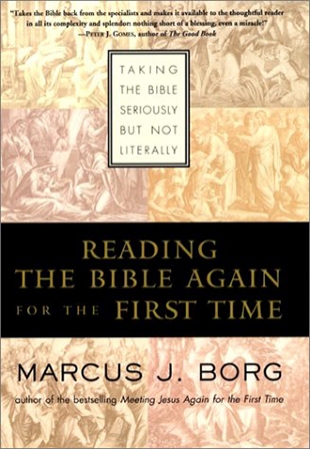Marcus J. Borg, author of the best-selling Meeting Jesus Again for the First Time, has a knack for clarifying difficult theological issues and writing in a pensive style that is extremely accessible to Christian laity and seekers of all stripes. Almost single-handedly, he has opened up new avenues of thought for lapsed or nonbelievers interested in re-visioning the Christianity of their childhood.
We salute Borg's courage and creativity in taking on the "single greatest issue dividing Christians in North America today . . . Separating the two groups are two very different ways of seeing three foundational questions about the Bible: questions about its origin, its authority, and its interpretation." He rightly characterizes the older understanding of Christianity as literalistic, doctrinal, moralistic, patriarchal, exclusivistic, afterlife-oriented, and traditional. Moderate-to-liberal Christians, mostly in mainline denominations, prefer to define the faith more broadly in terms of religious pluralism, historical and cultural relativity, modernity, and the movement toward postmodernity where the experiential dimension of religion — spirituality — is emphasized.
Borg sees the Bible as "the response of two ancient communities to their experience of God" — the Hebrew Bible of ancient Israel and the New Testament of the early Christian movement. He continues: "As the product of these two communities, the Bible thus tells us about how they saw things, not about how God sees things." He uses three helpful metaphors for scripture — it is a sacrament or mediator of the sacred, a finger pointing to the moon, and a lens for seeing life with God.
With the confidence of a teacher who knows his subject, Borg takes us on a grand tour of the creation stories, the Pentateuch, the prophets, Israel's wisdom literature, the gospels, the letters of Paul, and Revelation. Whether discussing the links between Lao-Tzu and the author of Ecclesiastes, examining the metaphoric meanings in the story of Jesus walking on the water, or shedding light on St. Paul's mystical experiences, Brg manages to dig deep into the sacred adventure of taking the Bible seriously but not literally, as the subtitle of his book proclaims. He enables us to honor the passion for justice of the prophets, Paul's ethic of transformation, and the gospels' message of compassion.
Borg concludes that Christians are called to "participate in the passion of God." Are you ready to dance?
